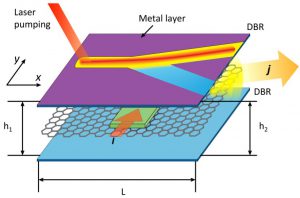Computational condensed matter uses computers to study fundamental properties of matter and energy, and their interactions. Computational research conducted by the condensed matter theory group at the Physics Department includes:
- Light-matter interaction with the focus on quantum transport phenomena in low-dimensional semiconductor nanostructures and graphene, including nonlinear exciton and polariton dynamics;
- Computer-assisted search for novel dielectric materials for energy storage;
- Development of new technologies for optical modulators and waveguides, including graphene-based photonic crystals;
- Bose-Einstein condensates of ultra-cold Rydberg atoms.
Left: Formation of a turbulent exciton Bose-Einstein condensate in coupled semiconductor quantum wells. Right: Computational design of a graphene-based polariton switch.




